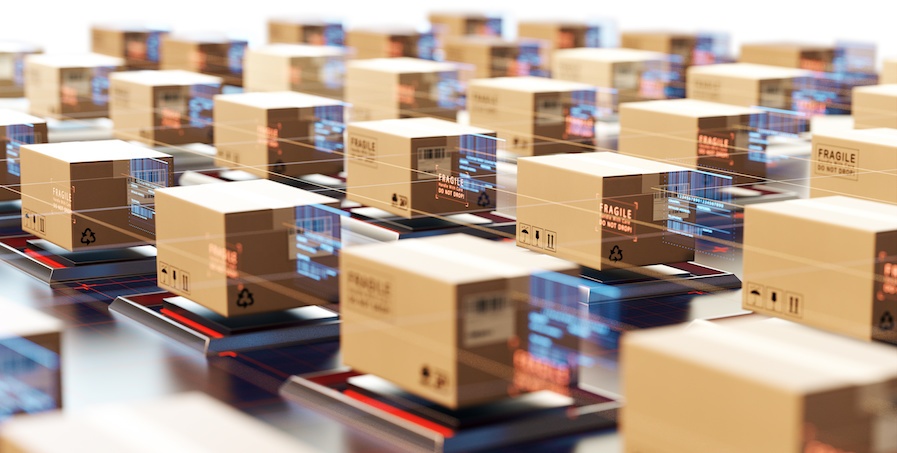
Like self-driving cars and fully automated homes, the potential of the blockchain is exciting—but implementation can struggle to meet its seamless, utopian pitch. Make no mistake: the blockchain is a huge leap forward in technology, efficiency, and transparency, but introducing new “genetics” to old systems can, much like humans, take a few generations before it truly realizes its potential. Fortunately, technological generations are extremely short in pursuit of new breakthroughs, and blockchain is no exception.
Using Blockchain in Logistics
One of the key strengths of blockchain technology is scalability and native integration—SMBs on through to corporations can make it a part of their approach to logistics, whether intrinsically or through partnering with a blockchain-savvy 3PL provider. Without the need to parse the industry-specific technologies currently in play, it can seamlessly move from task to task without the need for reprogramming or “shoehorning.”
- Tracing products: whether it has a best-by date or simply a large price tag, blockchain technology keeps a watchful eye on an entire supply chain’s worth of goods at once. Need to track down a “bad batch” for recall or testing, or simply want to be sure that theft doesn’t work its way into your logistics? Blockchain technology can handle it.
- Smoothing shipments: When your chain needs to stretch across the country or the ocean, having a standardized, universal-language approach to following progress will prevent many common slowdowns and mishaps. Blockchain shows when a product ships, when it passed through certain checkpoints, and when it arrives, enabling supply chain partners to prepare for and efficiently process items as they're en route.
- Product and fuel payments: Blockchain technology—smart contracts—can automatically trigger payments when certain criteria are met: a truck arriving at a checkpoint, or delivering a verified shipment from manufacturer to recipient. In some cases, a carefully-constructed implementation may even eliminate the need for—and, more importantly, the cost of—brokers.
- Truck maintenance and verification: Considering the huge waves the electronic logging mandate made through the logistics industry, having more control and better oversight on vehicles is a prudent investment. Blockchain can be used to track everything from odometer readings to hours driven per driver, to maintenance records, ensuring that your company stays in compliance.
So What’s Blocking Blockchain?
Business is conducted by default without blockchain—consider that with technologies as convenient as RFID chips and scanners, some warehouses still operate with paper at integral points. In other words, just because a technology is available doesn’t mean all businesses are obliged to use it.
One of the larger challenges is that many existing leaders don’t understand what blockchain fundamentally is. Others view it as a fad, just waiting it out while others cash out on the hype.
Even those with an interest in exploring it are hesitant to invest time and money into a technology that still lacks industry-wide standards and practices. Investing in blockchain without industry support is risky. In order for blockchain to be successful, everyone needs to “speak the same language.” This emphasizes the importance of organizations like Blockchain in Transportation Alliance (BiTA) working to unite behind a common framework of standards.
It’s also important to note the practical and legal hurdles blockchain will face through development. Companies may need to hire additional programmers as well as educate legal departments about new ways of doing business.
For most, it’s a waiting game—waiting for software, standards, and processes to develop. Thankfully, there are innovation-hungry companies who see the potential blockchain offers to the logistics industry.
Organizations Paving the Way
Early adopters are forming alliances to lay much of the important groundwork of introducing blockchain to their industry. BiTA, for instance, unites some of the largest shippers, 3PLs, and fleets across the country that see the potential blockchain has in logistics.
BiTA believes “Industry-wide, enthusiastic participation is key to extracting the full potential of benefits that blockchain technology promises.”
By uniting the industry behind a common framework, the hesitation will start to give way to wider adoption and fewer obstacles. Gartner suggests that non-pilot use of the blockchain in logistics will begin trending as early as 2021.
Learning Blockchain 101
Thought leaders within the blockchain community are also making headway into adoption through education. By making educational and certification resources available through learning centers like Udemy, they're broadening the base of professionals who grasp the benefits of adopting the technology. The most forward-thinking companies are also encouraging employees to stay up-to-date with sources such as FreightWaves for the industry and Coindesk for blockchain news at large. This enables entire teams to get adjusted to the idea of understanding and talking about the blockchain, making them much more efficient adopters when the time comes for company-wide implementation.
To Sum It Up
Yes, blockchain is new, and to some entrenched business professionals, it’s confusing on the surface. But technology's destiny is ultimately to bridge gaps—language, math, ability, and now transparency. Just like the first companies to embrace "horseless carriages," those that make a point of staying ahead of the movement with education and open-minded consideration will reap the rewards it has to offer. Get started on your own innovation enrichment by downloading our Supply Chain Innovation Technology eBook to discover the innovations that are driving the technological evolution of the logistics industry.



